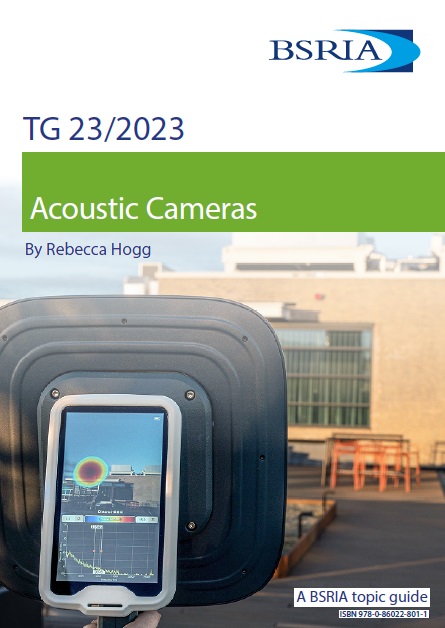Acoustic Cameras (TG 23/2023)
Acoustic Cameras (TG 23/2023) was written by Rebecca Hogg and published by BSRIA in July 2023.
This topic guide provides a broad overview of acoustic cameras – a technology which can be used to visually identify noise sources. It explains how an acoustic camera works, some of the applications of acoustic cameras, and the advantages and disadvantages of using acoustic cameras over other technologies.
Traditionally a sound level meter is used to measure noise levels, in decibels. Investigating noise sources can be achieved by systematically turning on and off noise sources and by using other investigation techniques. When troubleshooting building services systems, there are other investigation techniques that can be used such as vibration monitoring, air and water flow rate measurements, and pressure measurements. When using these, it may also be necessary to turn off systems and dismantle components. The advantage of using an acoustic camera over such investigation techniques is that an acoustic camera does not require systems to be broken into or sensors to be physically attached to a system.
An acoustic camera incorporates an array of microphones. It builds up an image by processing the information received at each of the microphones in the array, which all receive sound waves from the same source at slightly different times. The image produced uses colours to represent sound pressure levels. Typically, bright colours such as yellow are used to represent areas producing the most intense sound whereas darker colours such as purple are used to represent areas producing the least intense sound. The specific colours used, and the range of sound pressure levels represented by these colours, can be selected in the software used by acoustic cameras.
You can download the guide at: https://www.bsria.com/uk/product/rgooar/acoustic_cameras_tg_232023_a15d25e1/
--BSRIA
[edit] Related articles on Designing Buildings
Featured articles and news
Gregor Harvie argues that AI is state-sanctioned theft of IP.
Many resources for visitors aswell as new features for members.
Using technology to empower communities
The Community data platform; capturing the DNA of a place and fostering participation, for better design.
Heat pump and wind turbine sound calculations for PDRs
MCS publish updated sound calculation standards for permitted development installations.
Homes England creates largest housing-led site in the North
Successful, 34 hectare land acquisition with the residential allocation now completed.
Scottish apprenticeship training proposals
General support although better accountability and transparency is sought.
The history of building regulations
A story of belated action in response to crisis.
Moisture, fire safety and emerging trends in living walls
How wet is your wall?
Current policy explained and newly published consultation by the UK and Welsh Governments.
British architecture 1919–39. Book review.
Conservation of listed prefabs in Moseley.
Energy industry calls for urgent reform.
Heritage staff wellbeing at work survey.
A five minute introduction.
50th Golden anniversary ECA Edmundson apprentice award
Showcasing the very best electrotechnical and engineering services for half a century.
Welsh government consults on HRBs and reg changes
Seeking feedback on a new regulatory regime and a broad range of issues.
CIOB Client Guide (2nd edition) March 2025
Free download covering statutory dutyholder roles under the Building Safety Act and much more.

























